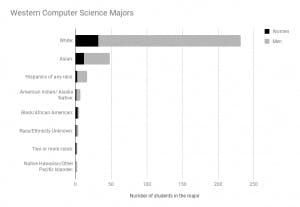By: Monique Merrill Chloe Yugawa became interested in computer science after watching a YouTube video featuring women in the technology industry when she was 17 years old. When she came to Western, she began taking computer science classes. Now she’s in her senior year, and is one of the few women in the department. “I like to be the flag runner for diversity in tech, and I talk to almost everybody about it,” Yugawa said. “I really encourage people to bring in different perspectives so we can have a good discussion about what’s going on.” The technology industry has a reputation for being a predominantly white male industry. According to the Taulbee survey by the Computing Research Association, the field is 17.9 percent women. These numbers don’t vary much with Western’s computer science program. In the 2015-2016 school year, the percent of women declared as computer science majors came in at 16.4 percent, just slightly lower than in the industry. In comparison, Western’s overall enrollment for fall of 2016 was 56.6 percent women.
“Some of them have really made me feel like a wild animal in class, like a rare exotic bird,” Yugawa said.“The demographics of our department does not match the demographics of Western,” Perry Fizzano, computer science department chair, said. The disproportion can potentially come down to the students’ perception of computer science, Fizzano said. “We’re trying to break down some of those stereotypes. We’re up against society,” Fizzano said. “How are computer scientists portrayed in the movies and TV shows? A lot of the time, it’s in a not so flattering way.” The department addressed the demographics in the new major orientation earlier this quarter. “There's a lot of supporting organizations and clubs within the department that are focused on trying to create an inclusive environment and a welcoming environment,” Fizzano said. Senior Francine Ninh is president of the Association for Women in Computing, one of the computer science clubs Fizzano mentioned. “We like to show support for each other,” said Ninh. She’s started introducing the club to women or people who are underrepresented in the technology community during their meetings. “There’s a lot of underrepresentation. I think the issue is that we need to start early,” Ninh said. “Having young girls or people of color introduced to STEM of computer science at an early age to balance out that diversity chart a little more.” Ninh recognizes the challenges of pursuing computer science. “It’s definitely intimidating going into a classroom. At first glance you seem like you’re the only girl, even though there may be two or three other girls there. In a dark lecture hall it’s hard to feel like you’re included,” Ninh said. For some members of the club, like Yugawa, feeling the gender divide can come not only from students but professors as well. “Some of them have really made me feel like a wild animal in class, like a rare exotic bird,” Yugawa said. “When I’m in a classroom environment, I don’t want to be called out or treated differently.”






